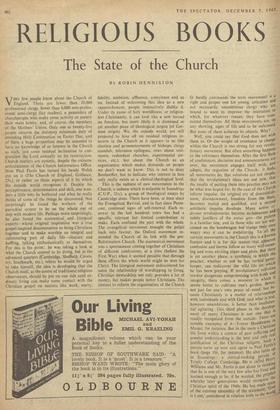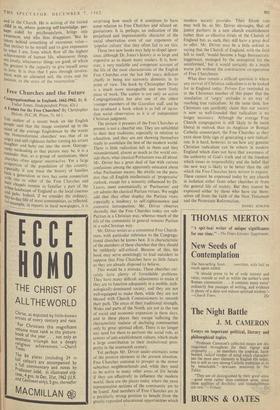RELIGIOUS BOOKS
The State of the Church
BY ROBIN DENNISTON VERY few people know about the Church of England. There are fewer than 20,000 professional clergy, fewer than 6,000 non-profes- sional semi-clergy (lay readers), a penumbra of churchpeople who make some activity or society their main hobby, and, of course, the members of the Mothers' Union. Only one in twenty-five people observe the statutory minimum duty of attending Holy Communion on Easter Day, and of these a huge proportion may be assumed to have no knowledge of or interest in the Church as such, just some residual inclination to con- gratulate the Lord annually on his resurrection. Church matters are esoteric, despite the extreme articulateness of the Church Information Office. Now Paul Ferris has turned his beady Welsh eye on it (The Church of Englund. Gollancz, 25s.), or rather on those aspects of it by which the outside world recognises it. Despite his perceptiveness, determination and skill, one won- ders a little why he bothered and what he really thinks of some of the things he discovered. Not surprisingly he found the workers of the parochial system to be on the whole out of step with modern life. Perhaps more surprisingly, he also found the ecumenical and liturgical experts—whose original inspiration was a true gospel-inspired determination to bring Christians together and to make worship an integral and culminating part of daily life—obscure and baffling, talking enthusiastically to themselves. For this is the point: he was taking a look at what the Church seemed to be doing, but in the advanced quarters (Cambridge, Sheffield, Coven- try, Southwark, etc.), where he would be urged to take himself, the idea is developing that the Church itself, as the centre of traditional religious observances, should be put on one side until or- dinary living can make some contact with the Christian gospel on matters like work, worry, fidelity, ambition, affluence, conscience and so on. Instead of welcoming this idea as a new rapprochement, people instinctively dislike it. Under its name of holy worldliness, or religion- less Christianity, it can look like a new inroad on freedom, but more likely it is dismissed as yet another piece of theological jargon (of Ger- man origin). We, the outside world, are still prepared to hive off on residual religious in- terests in the Church as it appears to us (the election and pronouncements of bishops, clergy scandals, television epilogues, rows about vest- ments, redundant churches, experimental ser- vices, etc.); but about the Church as an organisation which makes demands on people we don't want to know. This is not to deny Bonhoeffer, but to indicate why interest in him only really exists at a clerical-theological level.
This is the sadness of new movements in the Church. a sadness which is palpable in Soundings (C.U.P., 21s.), a group of theological essays by Cambridge dons. There have been, at least since the Evangelical Revival, and in fact since Pente- cost, continual signs of self-renewal. Each re- newal in the last hundred years has had a specific, relevant but limited contribution to make. Each confused the part with the whole. The evangelical movement brought the pulpit back into favour; the Oxford movement re- minded the Church of its link with the pre- Reformation Church. The ecumenical movement was a spontaneous coming together of Christians of different confessions, at a time (before the First War) when it seemed possible that through these efforts the whole world might be won for Christ. The liturgical movement rediscovered for some the relationship of worshipping to living. Christian stewardship not only provides a lot of money, but makes people better Christians. The instinct to reform the organisation of the Church (it hardly commands the term movement) is a right and proper one for young, articulate and not necessarily unambitious clergy who are bound to want to improve the institution to which, for whatever reason, they have com- mitted themselves. All these movements are, on any showing, signs of life and to be welcomed. But none of them achieves its objects. Why?
Well, you could say that God does not wish
them to. Or the weight of resistance to change within the Church is too strong for any revolu- tionar■,. movement. But often something happens to the reformers themselves. After the first flush of conferences, decisions and announcements are over, the movement engages itself with, and adapts, the organism of the Church: it finds, all movements do, that solutions are not simple,
own the revolutionary ideas are not new, that
the results of putting them into practice may not be what was hoped for. In the case of the Church reform impulse, the original cry of disestablish- ment, disendowment, freedom from the State, becomes muted and qualified, and a second, antithetic impulse develops. Many active Cl" v de vans revolutionaries become archdeacons and ". subtle justifiers of the status quo—the pattern is a familiar one, and to those who arc not wel- comed on the bandwagon but trudge their owweary way it can be embittering. To all the current movements in the Church this is a kn"'lli, feature and it is for this reason that apparel"' confusion and inertia follow so many well-mean- ing and even exciting plans and plots. But there is yet another phase, a synthesis, in which the poacher, whether or not he has turned game- keeper, can rediscover the wild life on which he has been preying. If revolutionary activities, Involve dangerous compromising with truth an:I, integrity, there comes a moment in which I' life lived within a context of past suffering all
Better, seems better to cultivate one's garden.
but E.te
not just for one's own peace of mind,
cause Christianity is a matter of relationships with individuals and with God, and what is real, however unambitious, is better than insubstan- tial agitating. This third phase in the develop- ment l
of many Christians is not one
readily recognised from the outside. There are notable examples of it—Trevor Huddleston.,In Masasi, for instance. But in the main a Christian present understanding is the best and only real justification of the Christian religion. Snell person turns up now and again in Paul Ferris's book (page 106, for instance). He also turns uP,, in . Soundings: a clerical-looking person a.'; Trinity College, Cambridge. He is called .0.11.11Y Williams and Mr. Ferris is not alone in thloki that he is one of the very few who has lived and learned enough to be, if he wanted, the prophet whereby later generations would recognise the Christian spirit of the 1960s. He has made ,-,115,ci of the extreme absurdity of the statement. —,,d is Love,' considered in relation both to the world and to the Church. He is writing of the buried child in us, whom growing self-knowledge, per- haps aided by psychoanalysis, brings into awareness and who thus disappears. 'But he leaves behind something of enormous value— that instinct to be myself and to give expression to what I am, from which flow all the highest achievements of human life, whatsoever things are lovely, whatsoever things are good, of which the greatest is the capacity to give myself away In love. It is thus that I pass through involve ment with an alienated self, the cross and the Passion, to the story of the resurrection.'







































 Previous page
Previous page